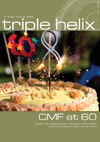Jewish Medical Ethics
This classic by former Chief Rabbi Immanuel Jakobovits was published 50 years ago, and a BMJ review brings pithy reminders of priorities: '…we speak of human duties, not of human rights, of obligations not entitlement. The Decalogue is a list of Ten Commandments not a bill of Human Rights. In the charity legislation of the Bible, for instance, it is the rich man who is commanded to support the poor, not the poor man who has the right to demand support from the rich.'
(BMJ 2009; 338:b2138)
Another 'medical classic'
Another review in the same series looks at John Wesley's 1747 Primitive Physic: Or, an Easy and Natural Method of Curing most Diseases. Wesley's uncle was a physician, and his Puritan great grandfather had studied theology and medicine at Oxford. Wesley's '20 rules for a healthy life' attracted criticism not from the medical profession but from 'fellow divines, who believed that some diseases were God's punishment for sin'.
(BMJ 2009;338:b908)
Liberating the laity
Christian history also provides a metaphor for considering the effect of the information revolution on doctor-patient relationships. Martin Luther and the Reformation are credited with empowering the laity through translations from Latin and putting Bibles into more people's hands, thus threatening the paternalistic power of the Catholic church in Europe; so the availability of medical information through the internet has 'brought the canon of medical knowledge…into the hands and homes of ordinary people'.
(BMJ 2009; 338:b1080)
What will Obama do about abortion and conscience?
The US President is considering rescinding protections the Bush administration adopted to enforce three federal conscience laws. A poll in March showed 87% of 800 adults believed it important to 'make sure that healthcare professionals in America are not forced to participate in procedures and practices to which they have moral objections'. President Obama has already restored US funding for the UN Population Fund with its controversial involvement in the Chinese forced abortion programme, and overturned the US ban on funding the pro-choice groups the International Planned Parenthood Federation and the Center for Reproductive Rights.
(http:
Debt and mental health
The Royal College of Psychiatrists has produced a particularly eye-catching 'Final Demand' booklet about the relationship between debt and mental health, subtitled 'What people want heath and social care workers to know and Do'. One in four people has a mental health problem; one in four of those is in debt; and debt may be a cause and consequence of mental health problems. With the recession worsening, and a 70% increased risk of suicide among the unemployed, the practical advice in the booklet is timely.
(www.mhdebt.info)
Medicine top career choice no longer
The Children's Mutual - a child trust fund provider - asked 1,000 customers what their 5-6 year olds wanted to be when they grew up. The job of doctor has dropped from first to second place since 2008. Eutychus is surprised that it is teaching that has gone up from third last year to take top spot.
(BMA News 2009; 30 May:3)
Discrimination against Christians
A recent Sunday Telegraph poll revealed that 50% of British Christians had suffered some sort of persecution for their faith; 44% said they had been mocked by friends, neighbours or colleagues; 20% said they had faced opposition at work; and 19% said they had been 'ignored' or 'excluded' because of their beliefs. Anecdotal evidence suggests these problems may be particularly prevalent in the National Health Service. (Sunday Telegraph 30 May 2009.
www.telegraph.co.uk
What Britons believe
Other polls reveal more about the confusing picture of spiritual beliefs in Britain today. 70% believe in the human soul but only 53% believe in life after death. 39% believe in ghosts, which is up from 10% in 1950, and 22% believe in astrology, again up from 7% in 1950. (MORI and the Daily Telegraph, quoted in Quadrant, May 2009 p6)
Fearing the process of dying
Yet another poll, by public theology think tank Theos, suggests that half the population have the Woody Allen approach: 'I'm not afraid of dying; I just don't want to be there when it happens'. In a poll of over 1,000 adults, 20% admitted they feared both the way they will die and death itself. 30% feared the way they will die but not death itself; while 25% fear neither death nor the way they will die. The highest proportion fearing both was among 18-24 year olds (26%). 42% of over-65s believed their religious faith helps them deal with the death of a loved one and prepare for their own death, compared with only 23% of the 18-24s.
(www.theosthinktank.co.uk)
So we do need chaplains
With secularists campaigning that chaplains should be paid for by the church and not out of NHS budgets, these figures show the significance of spiritual aspects of health care. Further strong anecdotal support is provided by the death of Adrian, a 25 year old journalist, from leukaemia. Adrian's blog recorded his appreciation of the chaplain's listening; the chaplain writes 'Adrian's case highlights the fact that asking whether a patient is religious or not is an inappropriate way to discern whether chaplaincy support would be of benefit to them'.
(BMJ 2009;338:b1403)































